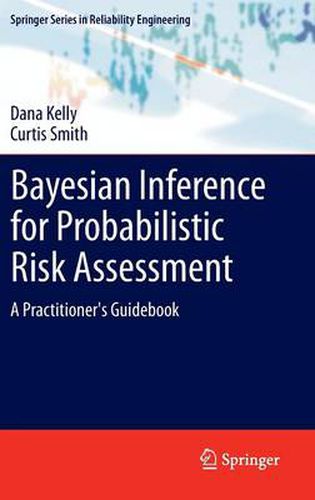Readings Newsletter
Become a Readings Member to make your shopping experience even easier.
Sign in or sign up for free!
You’re not far away from qualifying for FREE standard shipping within Australia
You’ve qualified for FREE standard shipping within Australia
The cart is loading…






This title is printed to order. This book may have been self-published. If so, we cannot guarantee the quality of the content. In the main most books will have gone through the editing process however some may not. We therefore suggest that you be aware of this before ordering this book. If in doubt check either the author or publisher’s details as we are unable to accept any returns unless they are faulty. Please contact us if you have any questions.
Bayesian Inference for Probabilistic Risk Assessment provides a Bayesian foundation for framing probabilistic problems and performing inference on these problems. Inference in the book employs a modern computational approach known as Markov chain Monte Carlo (MCMC). The MCMC approach may be implemented using custom-written routines or existing general purpose commercial or open-source software. This book uses an open-source program called OpenBUGS (commonly referred to as WinBUGS) to solve the inference problems that are described. A powerful feature of OpenBUGS is its automatic selection of an appropriate MCMC sampling scheme for a given problem. The authors provide analysis building blocks that can be modified, combined, or used as-is to solve a variety of challenging problems.
The MCMC approach used is implemented via textual scripts similar to a macro-type programming language. Accompanying most scripts is a graphical Bayesian network illustrating the elements of the script and the overall inference problem being solved. Bayesian Inference for Probabilistic Risk Assessment also covers the important topics of MCMC convergence and Bayesian model checking.
Bayesian Inference for Probabilistic Risk Assessment is aimed at scientists and engineers who perform or review risk analyses. It provides an analytical structure for combining data and information from various sources to generate estimates of the parameters of uncertainty distributions used in risk and reliability models.
$9.00 standard shipping within Australia
FREE standard shipping within Australia for orders over $100.00
Express & International shipping calculated at checkout
This title is printed to order. This book may have been self-published. If so, we cannot guarantee the quality of the content. In the main most books will have gone through the editing process however some may not. We therefore suggest that you be aware of this before ordering this book. If in doubt check either the author or publisher’s details as we are unable to accept any returns unless they are faulty. Please contact us if you have any questions.
Bayesian Inference for Probabilistic Risk Assessment provides a Bayesian foundation for framing probabilistic problems and performing inference on these problems. Inference in the book employs a modern computational approach known as Markov chain Monte Carlo (MCMC). The MCMC approach may be implemented using custom-written routines or existing general purpose commercial or open-source software. This book uses an open-source program called OpenBUGS (commonly referred to as WinBUGS) to solve the inference problems that are described. A powerful feature of OpenBUGS is its automatic selection of an appropriate MCMC sampling scheme for a given problem. The authors provide analysis building blocks that can be modified, combined, or used as-is to solve a variety of challenging problems.
The MCMC approach used is implemented via textual scripts similar to a macro-type programming language. Accompanying most scripts is a graphical Bayesian network illustrating the elements of the script and the overall inference problem being solved. Bayesian Inference for Probabilistic Risk Assessment also covers the important topics of MCMC convergence and Bayesian model checking.
Bayesian Inference for Probabilistic Risk Assessment is aimed at scientists and engineers who perform or review risk analyses. It provides an analytical structure for combining data and information from various sources to generate estimates of the parameters of uncertainty distributions used in risk and reliability models.